Israeli air and ground forces are stepping up operations in Gaza, Israel's chief military spokesperson has said, amid reports of heavy bombing of the besieged enclave.
Internet and mobile phone services were cut off in the Palestinian territory, a local telecoms firm and the Red Cross said.
"In the last hours, we intensified the attacks in Gaza," Rear Admiral Daniel Hagari told a televised news briefing, raising expectations that the long-anticipated ground invasion of Gaza may be beginning.
He said the air force was conducting extensive strikes on tunnels and other infrastructure.
"In addition to the attacks carried out in the last few days, ground forces are expanding their operations tonight," he said.
Hamas has called on the world to "act immediately" to stop Israel's bombardment. "We call on the Arab and Muslim countries and the international community to take responsibility and act immediately to stop the crimes and series of massacres against our people," the group said in a statement.
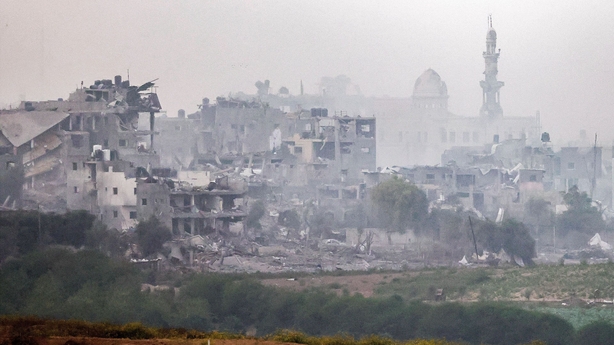
Israeli forces have massed outside Gaza, where Israel has been conducting an intense campaign of aerial bombardment since a deadly 7 October attack on Israel by the Islamist movement Hamas.
Palestinian mobile phone service provider Jawwal said that services including phone and internet had been cut by heavy bombardment.
A statement from the Palestine Red Crescent Society said it had completely lost contact with its operations room in Gaza and all its teams operating on the ground.
Israel says it is preparing a ground invasion, but has been urged by the US and Arab countries to delay an operation that would multiply the number of civilian casualties in the densely populated coastal strip and might ignite a wider conflict.
Earlier, the Israeli army accused Hamas of using hospitals in Gaza as operational centres for directing attacks against Israel.
"Hamas wages war from hospitals" in Gaza, military spokesman Daniel Hagari said this afternoon, adding that the Islamist group was also using fuel stored in these facilities for carrying out its operations.
He also said that Hamas "has turned hospitals into command and control centres and hideouts for Hamas terrorists and commanders".
Mr Hagari showed photographs, diagrams and audio recordings he said showed how Hamas was using the hospital system and Al Shifa Hospital in particular to hide a variety of command posts and entry points into the extensive tunnel network under Gaza.
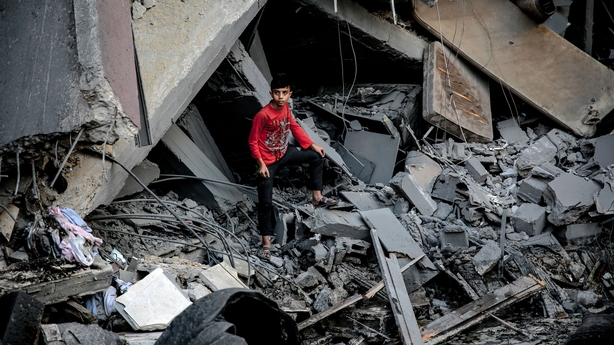
In response, Hamas called the charges unfounded.
Izzat al-Rishq, a member of the movement's political bureau, said on Telegram: "There is no basis in truth to what was reported by the enemy army spokesman."
He accused Israel of spreading lies as "a prelude to committing a new massacre against our people".
The comments came as Israeli forces have massed outside Gaza and conducted raids into the enclave in preparation for an expected ground offensive in retaliation for the deadly Hamas attack on Israel that killed some 1,400 people.
Israeli jets and artillery have since pounded the enclave, destroying large areas and killing more than 7,000 people, according to Gaza health ministry figures.
The Israeli military has regularly accused Hamas of basing leadership and operational centres in residential areas or around schools or hospitals.
UN officials have called for a pause in fighting to allow aid into the enclave, where more than one million people have been displaced, and have warned they may have to cease operations if no fuel supplies get through.
Ceasefire needed to release hostages
A Hamas official this afternoon tied the release of hostages held in Gaza to a ceasefire in Israel's bombardment of the enclave.
The Russian newspaper Kommersant quoted a member of a Hamas delegation visiting Moscow as saying time was needed to locate all those who had been abducted by various Palestinian factions in the Hamas attack on 7 October.
"They seized dozens of people, most of them civilians, and we need time to find them in the Gaza Strip and then release them," Abu Hamid said.
He said Hamas, which has freed four hostages so far, had made clear it intended to release "civilian prisoners".
But this required a "calm environment", he said, repeating an assertion that Israeli bombing had already killed 50 of those held.
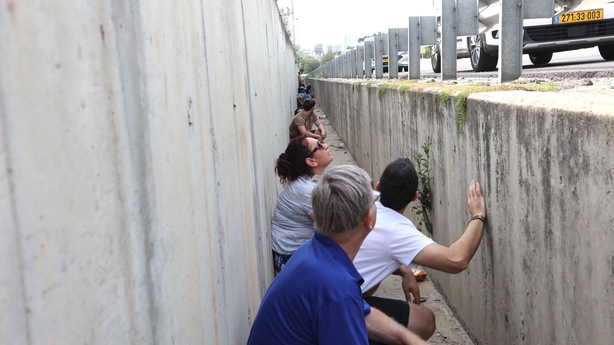
Palestinian militants clashed with Israeli troops in at least two areas inside Gaza, the latest of several small-scale incursions, Hamas-affiliated media reported, though the Israeli military did not immediately confirm the reports.
Residents of central Gaza said they had heard an apparent exchange of fire as well as heavy shelling and air strikes along the border, with Israeli planes dropping flares and bombs.
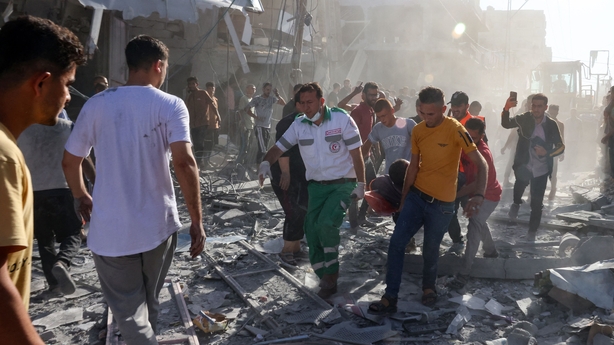
Hamas' al-Qassam Brigades said Israeli forces had attempted to land on a beach at the southern end of Gaza.
Israel said its fighter jets had struck three senior Hamas operatives who played significant roles in the 7 October attack, though there was no announcement by Hamas.
In early afternoon, rocket sirens sounded throughout southern Israel and an Israeli medic said three people had been wounded when a missile hit an apartment building in Tel Aviv.
As Gaza's 2.3 million civilians grow more desperate under a siege that has cut power and water as well as supplies of food, fuel and medicine, the issue of aid has come before the 193-member UN General Assembly in New York.
Unlike in the UN Security Council, where resolutions on aid for Gaza failed this week, there can be no veto on the resolution by Arab states calling for a ceasefire, which will not be binding but carry political weight.
The UN agency for Palestinian refugees, UNRWA, says more than 600,000 Gazans have been made homeless, at least three times more than its shelters can hold.
Read more:
WHO's Dr Michael Ryan calls for immediate humanitarian ceasefire in Gaza
UN members urged to help 'save lives and end violence'
Ten more trucks of food and medical supplies arrived in Gaza from Egypt, along with ten foreign doctors - the first to enter since Israel tightened its blockade nearly three weeks ago, a Palestinian official said.
This made for around 84 trucks in three weeks.
The UN says Gaza needs around 100 relief trucks every day, and the official said negotiations were taking place with Israel, which wants to prevent resources reaching Hamas, to find a faster mechanism.
UNRWA head Philippe Lazzarini said 57 UNRWA workers had been killed in Israeli bombardments, and UN human rights spokesperson Ravina Shamdasani became emotional when describing conditions for UN staff.
"Many of them are sleeping out in the open ... You have to make calculations about whether a ceiling collapsing on you or being hit by shrapnel is more likely to happen," she said.
A UN World Food Programme representative said only one of two bakeries it had contracted to feed thousands of displaced families had fuel to make bread, "and tomorrow there might be none".
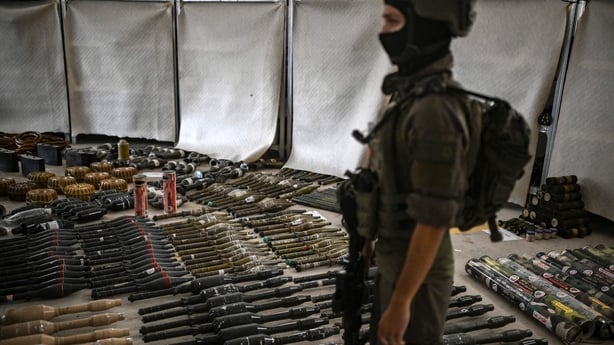
Calls for restraint stem not only from concern for Gaza's civilians and Israeli hostages, but also fears that the crisis could spark conflict across the Middle East.
US President Joe Biden ordered overnight strikes on two Syrian bases used by Iran's Revolutionary Guard Corps and militias that it backs, the Pentagon said, after issuing a rare direct warning to Iran on Thursday not to attack US troops.
US and coalition troops have been attacked at least 19 times in Iraq and in Syria by Iranian-backed forces in the past week.
Israel says Hamas killed some 1,400 people including children in its 7 October attack.
The Gaza health ministry said 7,326 Palestinians had been killed in the retaliatory air strikes, including around 3,000 children.
Mr Biden has cast doubt on casualty figures provided by Palestinian officials in Gaza, but international aid agencies say they are broadly accurate and have been reliable in the past.
In a poll in Israel's Maariv newspaper, 49% of Israelis said "it would be better to wait" before beginning a large-scale ground offensive, while 29% disagreed.
A week earlier, 65% had backed a ground invasion.

